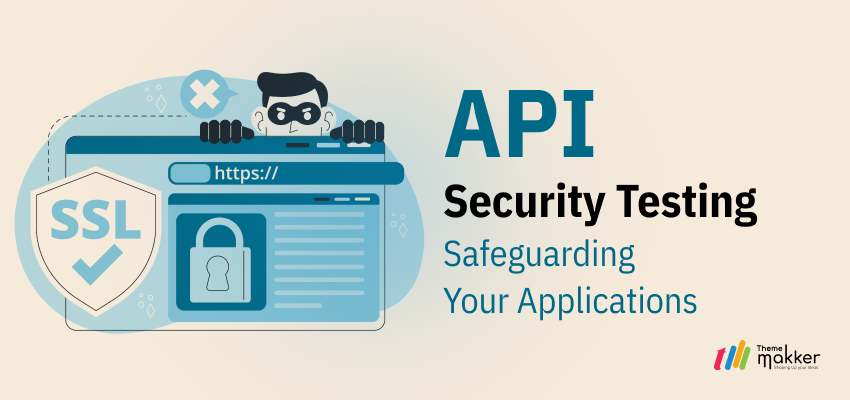-

April 25, 2024
API Security Testing: Safeguarding Your Applications
APIs provide communication between various software systems in the modern digital world. However, with greater connection, security measures must be implemented to safeguard sensitive data and prevent illegal access. API security testing is critical for ensuring that APIs are secure and safe to use.
What is API security testing?
API security testing evaluates an API’s security measures to identify vulnerabilities and weaknesses. The process includes analyzing the API’s security controls, protocols, and configurations to mitigate potential security risks using manual and automated testing techniques.
What is the importance of API security testing?
API security needs to be prioritized because of the vital role APIs play in contemporary software development. An organization’s reputation and finances may suffer greatly as a result of compromised systems, illegal access, and data breaches caused by improperly guarded APIs.
Common Security Risks in APIs
APIs are susceptible to various security vulnerabilities and threats, including:
Injection attacks
Injection attacks, such as SQL injection and XML injection, occur when malicious code is injected into API requests to manipulate or access sensitive data.
Broken authentication
Broken authentication vulnerabilities allow attackers to bypass authentication mechanisms and gain unauthorized access to APIs or sensitive information.
Insecure direct object references
Insecure direct object references occur when APIs expose internal object references, allowing attackers to manipulate or access unauthorized data.
Security misconfiguration
Security misconfigurations, such as default settings or improperly configured access controls, can leave APIs vulnerable to exploitation by attackers.
Cross-site scripting (XSS)
Cross-site scripting vulnerabilities allow attackers to inject malicious scripts into web pages accessed by users through APIs, potentially leading to data theft or manipulation.
Approaches to API Security Testing
There are several approaches to API security testing, including:
Static analysis
Static analysis involves analyzing the source code or API specifications without executing the software. It helps identify security vulnerabilities early in the development lifecycle.
Dynamic analysis
Dynamic analysis involves testing APIs in a runtime environment to identify security vulnerabilities that may not be apparent in static analysis. It simulates real-world usage scenarios to assess the effectiveness of security controls.
Fuzz testing
Fuzz testing, also known as fuzzing, involves sending invalid or unexpected input to APIs to identify potential vulnerabilities or weaknesses in input validation and error-handling mechanisms.
Penetration testing
Penetration testing involves simulating real-world attacks on APIs to identify security vulnerabilities and weaknesses that malicious actors could exploit. It helps assess the effectiveness of security controls in detecting and preventing attacks.
Best Practices for API Security Testing
To ensure effective API security testing, organizations should adhere to the following best practices:
Define security requirements
Define clear security requirements and objectives for API security testing to ensure comprehensive coverage of potential vulnerabilities and risks.
Use authentication and authorization
Implement robust authentication and authorization mechanisms to control access to APIs and prevent unauthorized users from accessing sensitive data.
Implement encryption
Encrypt sensitive data transmitted between clients and APIs using industry-standard encryption protocols to protect against eavesdropping and data interception.
Regularly update and patch
Regularly update and patch APIs and underlying software components to address known vulnerabilities and weaknesses.
Tools for API Security Testing
Several tools are available for conducting API security testing, including:
- OWASP ZAP
- Postman
- Burp Suite
- SoapUI
These tools offer various features and functionalities for analyzing, testing, and securing APIs against potential security threats and vulnerabilities.
Challenges in API Security Testing
Despite its importance, API security testing presents several challenges, including:
Lack of standardization
The lack of standardized testing methodologies and frameworks makes it challenging for organizations to conduct consistent and comprehensive API security testing.
Complexity of modern APIs
The increasing complexity of modern APIs, including RESTful APIs and microservices architectures, poses challenges for effective security testing due to their distributed and interconnected nature.
Continuous integration/continuous deployment (CI/CD)
The adoption of CI/CD practices introduces additional complexities for API security testing, requiring organizations to integrate security testing into automated build and deployment pipelines.
Lack of expertise
The shortage of skilled professionals with expertise in API security testing poses a significant challenge for organizations seeking to implement robust security measures.
Benefits of API Security Testing
Effective API security testing offers several benefits, including:
- Preventing data breaches and unauthorized access to sensitive information.
- Maintaining customer trust and confidence in the security of applications and services.
- Ensuring compliance with regulatory requirements and industry standards.
Conclusion
In conclusion, API security testing is essential for safeguarding applications and protecting sensitive data from security threats and vulnerabilities. By following best practices, leveraging appropriate tools, and addressing common challenges, organizations can enhance the security posture of their APIs and mitigate the risk of data breaches and cyberattacks.
FAQs
What is API security testing?
API security testing involves evaluating the security measures of an API to identify vulnerabilities and weaknesses that could be exploited by malicious actors.
Why is API security testing important?
API security testing is important for ensuring the integrity and security of applications and protecting sensitive data from unauthorized access and exploitation.
What are some common security risks in APIs?
Common security risks in APIs include injection attacks, broken authentication, insecure direct object references, security misconfigurations, and cross-site scripting (XSS) vulnerabilities.
What are the best practices for API security testing?
Best practices for API security testing include defining security requirements, using authentication and authorization, implementing encryption, and regularly updating and patching APIs.
What tools are available for API security testing?
Tools such as OWASP ZAP, Postman, Burp Suite, and SoapUI are commonly used for API security testing, offering various features for analyzing, testing, and securing APIs against potential vulnerabilities and threats.
For 5+ years, we are reliable service providers to our customers with the essential goal of consistently delivering quality. Our strength lies in shared ideas and returns to the community.